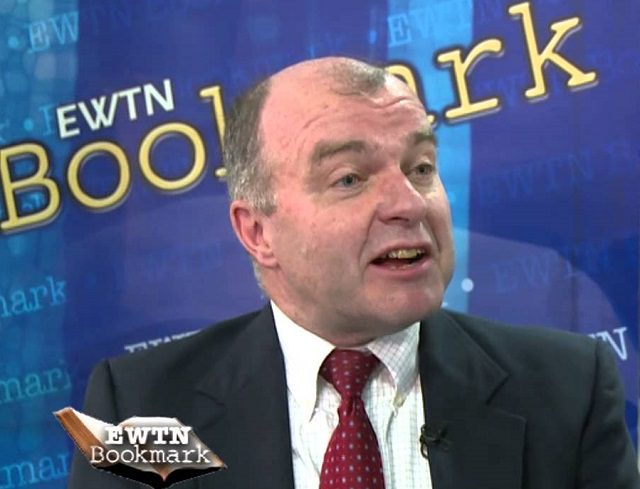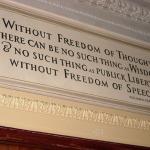. . . That is, He Deliberately Sows Confusion, When it Need Not Be So At All

Phil Lawler has engaged yet again in condescending rhetoric regarding Pope Francis, in his latest hit-piece: “Yes, the Pope is a Catholic. But he’s confusing other Catholics.” (4-26-18). Recently (15 days ago), I announced a self-imposed moratorium on articles about Pope Francis, because rational, calm, constructive, factual discussion about the Holy Father is (in my opinion, from now five years of experience) basically no longer possible in the present toxic environment. That’s mostly why I stopped (having done far more than my share in the first place: 119 separate articles, including this one).
An exception to a self-imposed rule or “resolution” is just that, so no one should think I have changed my mind. I may allow exceptions now and then, as occasions warrant. I was made aware of Lawler’s outrageous piece (one of many such), in a PM and I simply cannot not respond to such foolishness and hypocrisy. Lawler’s words will be in blue.
***
Blogger Mark Mallett has done a real service—and I mean this sincerely—by a long list of links to statements by Pope Francis voicing clearly orthodox Catholic beliefs on topics important to conservative Catholics, including abortion, euthanasia, same-sex marriage, population control, ideology, and the existence of hell.
At least Lawler had the sense and rudimentary fairness to link to a source that does show that Pope Francis is orthodox. He could have just as easily linked to a similar paper (from Dan Marcum that I have hosted on my blog for over three years now (material originally posted on the Catholic Answers discussion forum). Then imagine: Phil would have to agree that I (and Dan Marcum) have “done a real service”!
And Lawler could have long since compiled such a resource himself, if he is so worried and concerned about teaching the faithful that the pope is orthodox.
It’s difficult to imagine that anyone would have compiled a similar set of links to demonstrate that Pope Benedict XVI or Pope John Paul II held conventionally Catholic beliefs.
I was quite busy defending them, too (in my 22 years online), against various false charges (especially in Pope St. John Paul II’s latter years, where it was virtually open season on him in certain circles, and regarding the trashing of his canonization itself). Granted, it was not as often as now, for several reasons, but the critics were assuredly out there, and they were mostly radical Catholic reactionaries.
What’s notable and surprising these days is that the papal critics have largely adopted reactionary methodologies and mentalities (I’m not saying that all papal critics agree with all aspects of reactionaryism; I do not say — and have never said — that Lawler himself is a reactionary). Error and falsehood very often have a “recycled and regurgitated” nature. Nothing new under the sun . . .
Precisely the same argument could be and has been made with regard to Blessed Pope Paul VI. All acknowledge that there was widespread confusion following Vatican II. The theological liberals / dissidents claimed that Vatican II was subversive of prior and established Catholic tradition, and they exploited this falsehood (the so-called “spirit of Vatican II”) to the hilt.
Reactionaries (who fundamentally think like both liberals and Protestants) came to believe the same thing. It was widely held then (and more so since) that Pope Paul VI was not decisive enough in clarifying and refuting all the nonsense that occurred during that troubled period (i.e., very much the same criticism we hear now about Pope Francis).
People usually didn’t dispute that he was orthodox. But they thought he was lax and should have done a lot more to lessen the widespread confusion. Whether he was or not (I actually tend to agree that he was too lax during those 13 years) is beyond our purview. My present point is the analogy to Pope Francis. Both men are orthodox, and both were or are accused of allowing (moral and/or doctrinal and/or liturgical) confusion to unnecessarily spread.
And by the way, Phil Lawler (acting like a good reactionary zealot in this instance and in his pope-bashing) has already started questioning Vatican II itself (in an article dated 8-23-17):
Did the problems that arose after Vatican II come solely because the Council’s teachings were ignored, or improperly applied? Or were there difficulties with the documents themselves? Were there enough ambiguities in the Council’s teaching to create confusion? If so, were the ambiguities intentional—the result of compromises by the Council fathers? . . .
[A]re there troublesome elements of the Council’s teaching, with which we should now grapple honestly? One thing is certain: we will not solve the problem by pretending that it does not exist.
Why is it necessary in the case of Pope Francis?
I would say that the primary (or at least a major) reason is because of folks like Phil Lawler, who appear to want to spread far and wide the “fact” that Pope Francis is to blame for all the confusion. I submit that there would be a lot less confusion if Lawler and those like him weren’t doing the destructive, gossipy, rumormongering things they are doing now, causing all sorts of division and scandal: a shameful thing indeed.
If Lawler is so worried and concerned about the pope sowing confusion, he ought to also worry about his responsibilities as a teacher, since he, too, is sowing confusion big-time himself, when he could have been out there doing what I did: showing that the pope believes in hell, period. Full stop. Next question . . . That would help lessen confusion among the faithful, wouldn’t it? That’s what a defender of Holy Mother Church, concerned about the flock and about orthodoxy, does.
We are already seeing signs that anti-Catholic mockers of the Church love Lawler’s book, and of course, so does former Catholic Rod Dreher. Such people love books that bash the pope and in effect, also Holy Mother Church. It’s a godsend for them: confirming them in their errors; allowing them to preserve the rationalizations and the disinformation in their heads.
But instead, Lawler would rather hypocritically enter right into what he is criticizing, and help folks become more confused and more anti-Francis. There is a reason that Scripture says, “Let not many of you become teachers, my brethren, for you know that we who teach shall be judged with greater strictness” (James 3:1; RSV), Lawler appears to be far more interested in muckraking, National Enquirer-type journalism than he is in teaching the faithful what the pope actually believes. Instead, he helps (whether unwittingly or not) to spread confusion with these sorts of statements:
Pope Francis himself has raised the questions about his own orthodoxy, with a long series of provocative public statements. . . .
When any Pope makes a statement that seems at odds with previous expressions of the faith, it is disquieting. When he makes such statements frequently—and, to compound the problem, declines to clarify them—the result is widespread disorientation.
. . . not that Pope Francis is preaching heresy, but that he has spread confusion about the content of orthodox Catholic belief. . . .
And after all what does Pope Francis believe about Hell? He has alluded to its existence on many occasions. Still it is possible that he might proclaim belief in Hell without accepting anything like the ordinary Catholic understanding of what Hell is. . . .
Yes, the Pope is a Catholic. But he sometimes sounds like a confused Catholic, and therefore a confusing Catholic leader. To recognize that problem does not require accusing the Pope of heresy; the confusion among the faithful is trouble enough.
Like it’s a big mystery what the pope believes? Lawler has been shown over and over that the pope clearly accepts the orthodox view of hell and of Satan, but it doesn’t matter. Documented facts of this nature don’t fit into his agenda. After all, Eugenio Scalfari (the 94-year-old atheist who cites the pope’s “words” in interviews merely from his memory) says the pope doesn’t, and also that he doesn’t believe in heaven or purgatory, either, as was documented by Sandro Magister and the reactionary Lifesite News, where Scalfari “reported”:
Pope Francis has abolished the places where souls were supposed to go after death: hell, purgatory, heaven. The idea he holds is that souls dominated by evil and unrepentant cease to exist, while those that have been redeemed from evil will be taken up into beatitude, contemplating God.
So because Scalfari’s nonsense fits into Lawler’s cynical, confused, jaded narrative about the pope, he runs (the wrong way down the field) with that ball. I have wholeheartedly agreed with Karl Keating that it’s stupid for the pope to keep interviewing with Scalfari and for these controversies to keep coming up regarding him. But it’s even more stupid (exponentially more) for Lawler to keep making an issue of it when the pope clearly believes in eternal hellfire.
All he could manage to do in his book (on this topic) was cite Scalfari (regarding hell) and wonder aloud what the pope believes. He couldn’t trouble himself to spend ten minutes on Google to see what the pope has said in indisputably real, accurate quotations.
Instead, Lawler is much more motivated to crank out the lie that Pope Francis is a lying equivocator, speaking out of both sides of his mouth. This is the clear insinuation of much of his rhetoric. It was present in his book and is in subsequent articles. The lightly veiled implication is that when Pope Francis states orthodox notions, he doesn’t really mean it (wink wink nod nod). That’s just to fool people, you see.
Someone like Chris Ferrara (an extreme reactionary, not far from sedevacantism) says this quite brazenly and openly. Lawler (of much less bombastic temperament) prefers to play games and mostly insinuate it — which assuredly he does — with nuance and subtlety: which I think is even more contemptible than what Ferrara does.
At times, Lawler comes right out and says that he believes the pope is deliberately speaking out of both sides of his mouth (which amounts to deception and lying, and an evil motivation: pure and simple). Here is a typical example, from his article, “Confusion—now about hell—is the hallmark of this pontificate” (3-29-18):
In Lost Shepherd I wrote: “The confusion in Amoris Laetitia is not a bug; it is a feature.” Pope Francis realized that he cannot directly contradict the perennial teaching of the Church, put forth so clearly by St. John Paul II. But he could and did create confusion about that teaching, and thereby provided new maneuvering room for those who are unhappy with the Church’s stand.
By the same logic, Pope Francis cannot deny the existence of hell without directly contradicting the teaching of the Church. But he can create confusion, and he has done so once again. Did he deny, or at least question, the existence of hell? We don’t know.
Now I ask you directly, dear reader: is this what you wish to / choose to believe: that the Holy Father is a deliberate liar and deceiver: purposely seeking to overthrow Catholic tradition and to be a dissident “radical” modernist (yes, Phil used that word, too, in his book)? We know that this is what Phil Lawler believes, since in the Introduction to his book, Lost Shepherd, he wrote that Pope Francis:
. . . [is] leading the Church away from the ancient sources of the Faith. . . . a source of division. . . . encouraged beliefs and practices that are incompatible with the prior teachings of the Church. . . . he has violated the sacred trust that is given to Peter’s successors. . . . a Roman pontiff who disregarded so easily what the Church has always taught and believed and practiced on such bedrock issues as the nature of marriage and of the Eucharist . . . a danger to the Faith . . .
I continue to maintain that Lawler has not proven his extraordinary accusations. He loves to repeat them. That’s what all mere propagandists and gossip-column type journalists do, because they know it works. But repetition itself is neither argument, nor does it strengthen a real and substantive, serious argument. Lawler simply hasn’t proven his case (which is one reason why he’s totally unwilling to defend it over against someone like me, who has substantively criticized it). Hence, I wrote at the end of my Amazon review of his pathetic, scandalous book:
In my opinion, he has absolutely failed to demonstrate that Pope Francis is deliberately trying to subvert or overthrow Catholic tradition. That hasn’t been even remotely proven in this book. . . .
Personally, I prefer hard facts, not “jesuitical” conspiracy theories. It was heartening, however, in the sense that if this is considered the best shot against the pope, then the fashionable “Francis is a heterodox bad pope” opinion indeed lacks a demonstrable basis.
***
Photo credit: Standard You Tube License: still from EWTN Bookmark (3-2-14).
***













